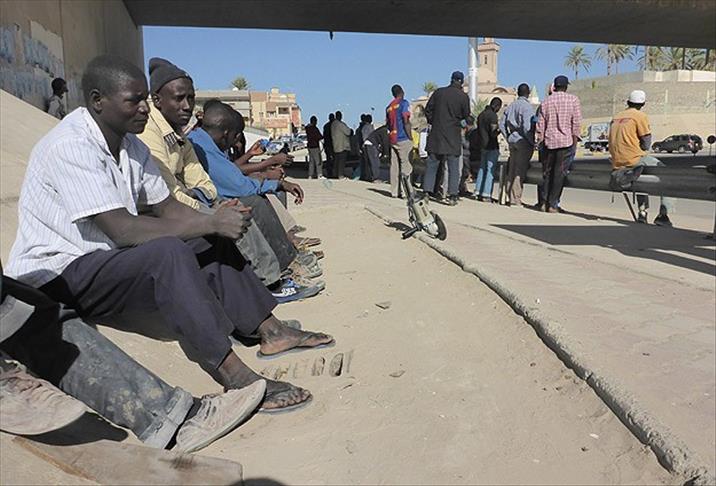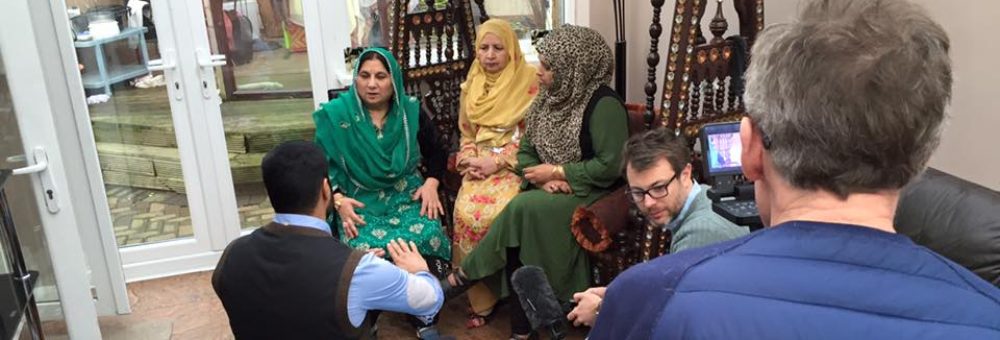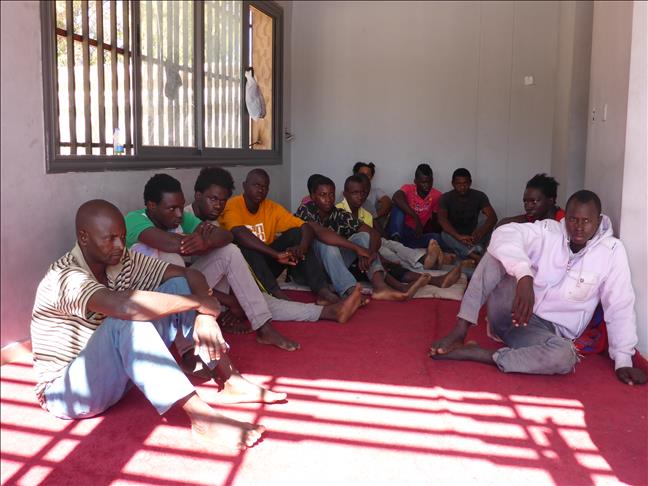Anadolu Agency investigates undocumented migrants in Libya

TRIPOLI
Before the uprising that ousted Libya’s long-time strongman Muammar Qaddafi, there were about one million black Africans living and working in Libya. However, during the conflict the situation deteriorated and forced many to flee the country. At the time international media outlets and human rights organisations reported cases of human rights violations against black Africans.
Rebel groups battling to topple Qaddafi have accused black Africans of supporting the regime and fighting as mercenaries for the late Libyan leader. Black Africans were not always fighting for Qaddafi while some were forced to fight, and others were wrongfully accused and ended up being imprisoned or killed at the hands of some rebel groups.
Some sub-Saharan Africans managed to leave the country during the conflict, but since the fall of the regime and a perceived change in conditions, many black Africans are now returning to Libya.
Amongst Libyans there are mixed feelings. Many hold discriminatory opinions of Africans. One business owner told me that he thought black Africans were dirty and unclean by saying, “they don’t like clean places, when I gave them a clean place to stay they made it dirty.”
Even amongst the most liberal and open-minded Libyans, discriminatory opinions are prevalent. It is a common occurrence to talk about the subject of black Africans with reference to their “differences” or how some Libyans feel that they are now like a minority in their own country in the face of immigration.
The racism these migrant workers face is only one of the horrors they encounter along the journey they take to support their families back home.
Libya has seen an increase of undocumented migrants trying to find work and some trying to reach Europe by boat. Migrants are put into different categories: regular and irregular migrants.
Regular migrants have visas and pass through official border entry posts. Irregular migrants tend to be undocumented and have no valid visa to be inside the country.
Then there are refugees and asylum seekers who may or may not come into the country through official border entries. The numbers of irregular migrants, asylum seekers and refugees are unknown at the moment.
The issue came to international attention when more than 360 migrants drowned in October this year trying to reach the Italian island of Lampedusa. Italy has asked for help from other European countries as the island of Lampedusa already has thousands of migrants at its facilities and is running over capacity.
– Waiting under bridge for work
We are waiting with a group of black Africans under a bridge in the residential neighborhood in Gargaresh in Tripoli. Cars speed past throwing dust up into the air. Their wheels sometimes spin on the dirt as they stop and then move off as the occupants look for manual labourers.
The men standing and waiting here sheltering from the sun are from all over Africa looking for work. Many of them do not have entry stamps on their passports, and some have no documents at all. They are all here to work, earn money, send it home, or save enough to pay smugglers for a long and perilous journey on a rickety boat to Italy.
Everyday John from Nigeria stands under this bridge seeking a daily job. Migrants crowd around the cars that stop, peering through the windows, as some get in and are driven away. They find work on construction sites, in homes, shops, restaurants and anywhere else they can. There is no job security here, no guaranteed pay, no minimum wage and no rights for workers. There is also another fear: the men are always looking out for the police.
There are limited police around as Libya is still in transition and the police force is not very visible or discernible from the many militias littering the country. When the police show up, these men run.
The fear is always palatable. If they are detained, it could mean they are repatriated to their home countries, but not before going through a detention centre. The detention centres are dreaded amongst these migrant workers given rumours of widespread abuse. Regardless of the challenges, all these men stand here every day indefatigably.
These men have come from Nigeria, Chad, Gambia, Mali and elsewhere. They confide in me and tell me of the lack of security. Just last week some Libyans mugged a few Nigerians.
“At night it is not safe for us here, many people have been mugged. They (Libyans) take our phones and money,” said James from Nigeria. It’s a voice of desperation. They are not the only ones who tell me about crimes committed against them, this seems a common story amongst migrants. I was told not to go out from my hotel after dark.
People have become accustomed to daily gunfire in Tripoli. Everyone seems to have a gun as no one feel safe without one, but the migrants do not have guns and there is no protection for their rights or an no one to ensure their safety.
“We are always worried, the situation is very bad at the moment,” says 24-year-old John.
His friends crowd around him as he talks to me and nod their heads in agreement. John smiles as he talks. Even when describing the most difficult aspects of his hard life here, he is smiling, speaking in English whilst gesticulating while explaining some of their challenges.
Migrants usually rent rooms or small kiosks and often share and live in over-crowded accommodations. It costs about 200 dinars ($150) a month that can sometimes mean half their salary so they share one room.
In another location I am given access to a room migrants’ employer provided them stay in. It is small; they can only sleep at the sides where they have thin mattresses laid out upon a raised platform made of breezeblock and concrete. The room is only big enough for six people to sleep, head to toes. There is one light, a plastic rug on the floor, and clothes hanging off nails on the wall. The roof looks like tin and the door is wooden. It is all they have, and not paying extra for rent will help them save money to send home or carry on their journey.
“I share a room with 10 to 15 people, it varies. I have no choice, it is what we have to do,” says Abou Bakr from Gambia, who has a wife and a two-year-old daughter in Gambia who he wants to return to.
Umar, a 24-year-old from Mali, tells me that he wants to go to Italy. “I don’t care if it is dangerous, I need to feed my family.”
Umar doesn’t have money yet, but hopes to save enough to pay smugglers to buy his seat on a boat to Lampedusa. It costs at least $1,000 to get to Lampedusa aboard a smuggler’s boat and it could take him more than six months to earn that kind of money.
“I have brothers and sisters that I have to support, that is my responsibility,” he tells me.
Migrants already face a difficult journey to get to Libya as they have to pay smugglers to cross several countries to enter Libya. The journey across the desert is especially precarious. With little food and water, migrants put their lives in the hands of smugglers. Sometimes migrants have to sleep out in the desert and there are cases where migrants have been taken to the wrong locations and been told they are in Libya. Some die in the desert when they fall off trucks, but even then the drivers do not stop.
Judging by the numbers of migrants entering Libya, many are prepared to take the risks. Osman from Gambia tells me he travelled through Senegal, Mali, Burkina Faso and then Niger to reach Libya.
“I paid about 2,000 dinars ($1,500) to get here from Gambia.
“It took me 10 days to get to Libya. It was a hard journey. We swapped vehicles several times and travelled a lot at night. I had to be careful, I did not want to fall off the vehicle and be left behind.
“I want to stay in Libya, work and then go back to my country. I miss my family. It’s not easy here,” says Osman.
The groups standing under the bridge in Tripoli are divided into their countries of origin. The Nigerians stand together, as do the Malians and Gambians and other nationalities.
The Nigerians complain to me that they sometimes do not get paid.
James says, “There is nothing we can do, they have guns, they are Libyan, and if they decide not to pay us, what are we supposed to do?”
Read the original article published in Anadolu Agency on 5 December 2013

 TRIPOLI
TRIPOLI